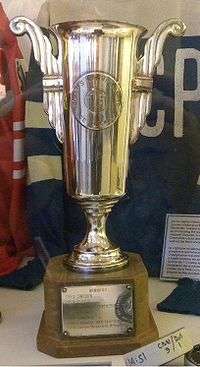Ice hockey at the 1956 Winter Olympics
The men's ice hockey tournament at the 1956 Winter Olympics in Cortina d'Ampezzo, Italy, was the 8th Olympic Championship, also serving as the 23rd World Championships and the 34th European Championships. The tournament was held at the Olympic Ice Stadium and the Apollonio Stadium.[1]
 | |
| Tournament details | |
|---|---|
| Host country | |
| Dates | 26 January – 4 February |
| Teams | 10 |
| Final positions | |
| Champions | |
| Runner-up | |
| Third place | |
| Fourth place | |
| Tournament statistics | |
| Matches played | 33 |
| Goals scored | 262 (7.94 per match) |
| Attendance | 122,230 (3,704 per match) |
| Scoring leader(s) | |

East and West Germany could not come to an agreement over how to formulate a combined team, so they played a qualification game against each other, which the west won. The east hosted a tournament for non qualified teams, often referred to as World Championships Pool B, between GDR, Norway and Belgium in Berlin.[2]
The Soviets won all their games to claim their first Olympic title, their second World title, and their third European title. Canada, represented by the Kitchener-Waterloo Dutchmen, won its eighth consecutive Olympic ice hockey medal, and first bronze medal.
Medalists
| Gold: | Silver: | Bronze: |
Nikolai Puchkov Grigory Mkrtychan Nikolaï Sologubov Dmitry Ukolov Ivan Tregubov Genrikh Sidorenkov Alfred Kuchevsky Yevgeny Babich Viktor Shuvalov Vsevolod Bobrov Yuri Krylov Aleksandr Uvarov Valentin Kuzin Yuri Pantjukhov Aleksey Guryshev Nikolay Khlystov Viktor Nikiforov |
Willard Ikola Don Rigazio Richard Rodenheiser Daniel McKinnon Ed Sampson John Matchefts Richard Meredith Dick Dougherty Ken Purpur John Mayasich Bill Cleary Wellington Burtnett Wendell Anderson Gene Campbell Gordon Christian Weldon Olson John Petroske |
Denis Brodeur Keith Woodall Floyd Martin Howie Lee Art Hurst Jack McKenzie James Logan Paul Knox Donald Rope Byrle Klinck Bill Colvin Gérard Théberge Alfred Horne Charlie Brooker George Scholes Bob White Ken Laufman |
Participating nations

.svg.png)
.svg.png)
World Championship Group A (Italy)
Qualification
- November 16, 1955
- East Germany 3-7 West Germany
First round
Top two teams (shaded ones) from each group earned a right to play for 1st-6th places.
Group A
| Rank | Team | Pld | W | L | T | GF | GA | Pts |
|---|---|---|---|---|---|---|---|---|
| 1 | 3 | 3 | 0 | 0 | 30 | 1 | 6 | |
| 2 | 3 | 1 | 1 | 1 | 9 | 6 | 3 | |
| 3 | 3 | 0 | 1 | 2 | 5 | 7 | 2 | |
| 4 | 3 | 0 | 2 | 1 | 2 | 32 | 1 |
- January 26
- Canada 4–0 Germany (UTG)
- Italy 2–2 Austria
- January 27
- Italy 2–2 Germany (UTG)
- Canada 23–0 Austria
- January 28
- Germany (UTG) 7–0 Austria
- Italy 1–3 Canada
Group B
| Rank | Team | Pld | W | L | T | GF | GA | Pts |
|---|---|---|---|---|---|---|---|---|
| 1 | 2 | 2 | 0 | 0 | 12 | 6 | 4 | |
| 2 | 2 | 1 | 1 | 0 | 7 | 4 | 2 | |
| 3 | 2 | 0 | 2 | 0 | 3 | 12 | 0 |
- January 27
- Czechoslovakia 4–3 USA
- January 28
- USA 4–0 Poland
- January 29
- Czechoslovakia 8–3 Poland
Group C
| Rank | Team | Pld | W | L | T | GF | GA | Pts |
|---|---|---|---|---|---|---|---|---|
| 1 | 2 | 2 | 0 | 0 | 15 | 4 | 4 | |
| 2 | 2 | 1 | 1 | 0 | 7 | 10 | 2 | |
| 3 | 2 | 0 | 2 | 0 | 8 | 16 | 0 |
- January 27
- USSR 5–1 Sweden
- January 28
- Sweden 6–5 Switzerland
- January 29
- USSR 10–3 Switzerland
Final round

First place team wins gold, second silver and third bronze.
| Rank | Team | Pld | W | L | T | GF | GA | Pts |
|---|---|---|---|---|---|---|---|---|
| 1 | 5 | 5 | 0 | 0 | 25 | 5 | 10 | |
| 2 | 5 | 4 | 1 | 0 | 26 | 12 | 8 | |
| 3 | 5 | 3 | 2 | 0 | 23 | 11 | 6 | |
| 4 | 5 | 1 | 3 | 1 | 10 | 17 | 3 | |
| 5 | 5 | 1 | 4 | 0 | 20 | 30 | 2 | |
| 6 | 5 | 0 | 4 | 1 | 6 | 35 | 1 |
- January 30
- USA 7–2 Germany (UTG)
- Canada 6–3 Czechoslovakia
- USSR 4–1 Sweden
- January 31
- USSR 8–0 Germany (UTG)
- Sweden 5–0 Czechoslovakia
- USA 4–1 Canada
- February 1
- USA 6–1 Sweden
- February 2
- Canada 10–0 Germany (UTG)
- USSR 7–4 Czechoslovakia
- February 3
- Czechoslovakia 9–3 Germany (UTG)
- Canada 6–2 Sweden
- USSR 4–0 USA
- February 4
- USSR 2–0 Canada
- Germany (UTG) 1–1 Sweden
- USA 9–4 Czechoslovakia
Consolation round
| Rank | Team | Pld | W | L | T | GF | GA | Pts |
|---|---|---|---|---|---|---|---|---|
| 7 | 3 | 3 | 0 | 0 | 21 | 7 | 6 | |
| 8 | 3 | 2 | 1 | 0 | 12 | 10 | 4 | |
| 9 | 3 | 1 | 2 | 0 | 12 | 18 | 2 | |
| 10 | 3 | 0 | 3 | 0 | 9 | 19 | 0 |
- January 31
- Switzerland 7–4 Austria
- February 1
- Poland 6–2 Switzerland
- Italy 8–2 Austria
- February 2
- Italy 8–3 Switzerland
- Poland 4–3 Austria
- February 3
- Italy 5–2 Poland
World Championship Group B (East Germany)
Final Round
| Rank | Team | Pld | W | L | T | GF | GA | Pts |
|---|---|---|---|---|---|---|---|---|
| 11 | 2 | 2 | 0 | 0 | 18 | 8 | 4 | |
| 12 | 2 | 1 | 1 | 0 | 8 | 9 | 2 | |
| 13 | 2 | 0 | 2 | 0 | 12 | 21 | 0 |
- March 8
- East Germany 4–1 Norway
- March 9
- East Germany 14–7 Belgium
- March 10
- Norway 7–5 Belgium
Statistics
Average age
Gold medalists team USSR was the oldest team in the tournament, averaging 29 years and 11 months. Team USA was the youngest team in the tournament, averaging 22 years and 5 months. Tournament average was 26 years and 7 months.[3]
Leading scorers
| Rk | Team | GP | G | A | Pts |
|---|---|---|---|---|---|
| 1 | 8 | 7 | 8 | 15 | |
| 2 | 8 | 7 | 7 | 14 | |
| 3 | 7 | 9 | 3 | 12 | |
| 4 | 8 | 7 | 5 | 12 | |
| 5 | 8 | 9 | 2 | 11 | |
| 6 | 7 | 8 | 3 | 11 | |
| 7 | 7 | 6 | 4 | 10 | |
| 8 | 8 | 5 | 5 | 10 | |
| 9 | 8 | 1 | 8 | 9 | |
| 10 | 6 | 5 | 3 | 8 |
Tournament awards
- Best players selected by the directorate:
- Best Goaltender:

- Best Defenceman:

- Best Forward:
.svg.png)
- Best Goaltender:
Final ranking
European Championship final ranking
Citations
- "Ice Hockey at the 1956 Cortina d'Ampezzo Winter Games". Sports Reference. Archived from the original on 17 April 2020. Retrieved 13 May 2019.
- World 'B'
- "Team Canada - Olympics - Cortina d'Ampezzo 1956 - Player Stats". QuantHockey. Retrieved 23 April 2020.
References
- Duplacey, James (1998). Total Hockey: The official encyclopedia of the National Hockey League. Total Sports. pp. 498–528. ISBN 0-8362-7114-9.
- Podnieks, Andrew (2010). IIHF Media Guide & Record Book 2011. Moydart Press. pp. 25–6, 30, 107–8.
- Jeux Olympiques d'Cortina d'Ampezzo 1956